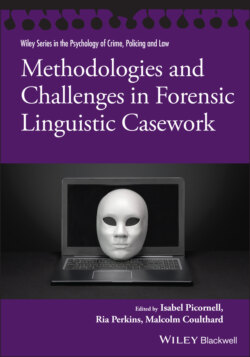Читать книгу Methodologies and Challenges in Forensic Linguistic Casework - Группа авторов - Страница 13
Section 1: Anonymous and Disputed Authorship Analysis
ОглавлениеThis section’s five chapters present different forensic linguistic approaches to dealing with challenges posed by questioned authorship. Tim Grant and Jack Grieve open this section in Chapter 2 with an authorship verification analysis for a police investigation. The chapter raises issues associated with cognitive biases and discusses the strengths and weaknesses of stylistic and stylometric approaches in this closed-set authorship verification problem. In contrast, in Chapter 3 Lisa Donlan and Andrea Nini face an authorship issue that they address by using authorship profiling in a Cyprus-based court case. Here, the emphasis is not on comparing texts but on building a socio-demographic profile of its author to determine whether that profile matches that of its stated author.
While Donlan and Nini’s case involves English speakers, in Chapter 4 Sheila Queralt deals with a long-running Spanish-language police investigation, illustrating how forensic linguistic analysis is applied to a language other than English. Queralt demonstrates how mixed methods approaches involving linguistic profiling and stylometric and stylistic analyses can contribute positively when working alongside other forensic sciences. In Chapter 5, Ria Perkins undertakes Other Language Influence Detection (OLID), linguistic profiling intended to indicate the first language of an author based on how they write in a second language. The section ends with Chapter 6, in which Rui Sousa Silva addresses a different type of authorship problem: detecting and analyzing for plagiarism. Sousa Silva’s discussion around the different strategies that plagiarists employ to steal other people’s written productions extends to the non-English-speaking world and highlights the growing problem of translingual plagiarism.
